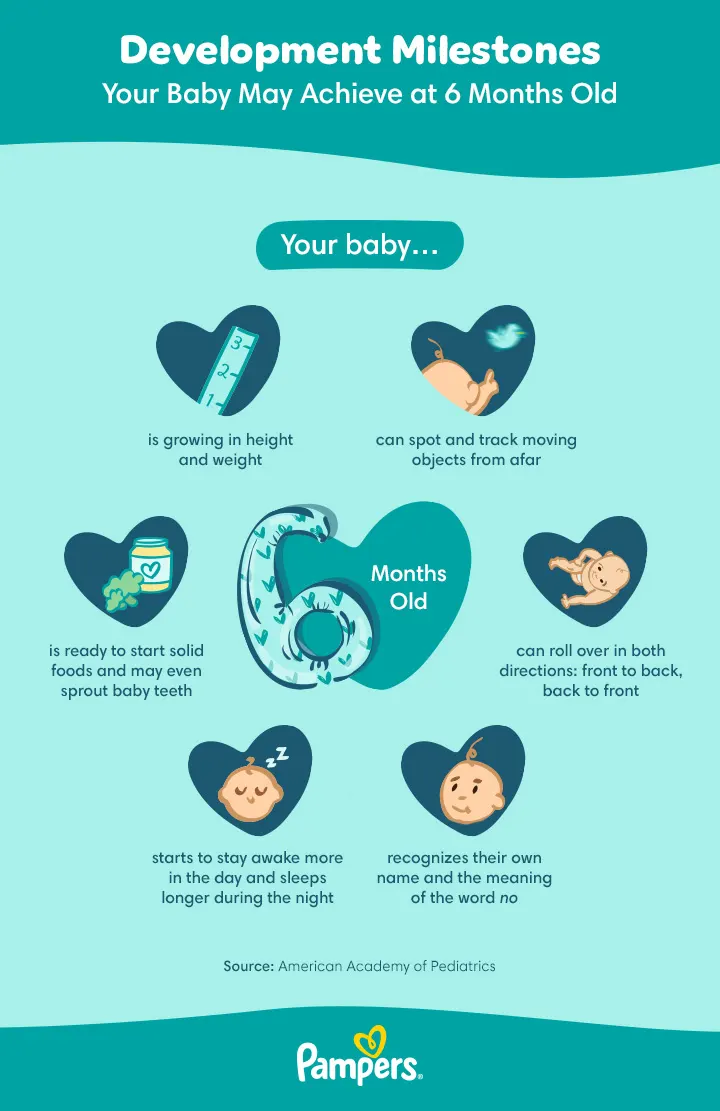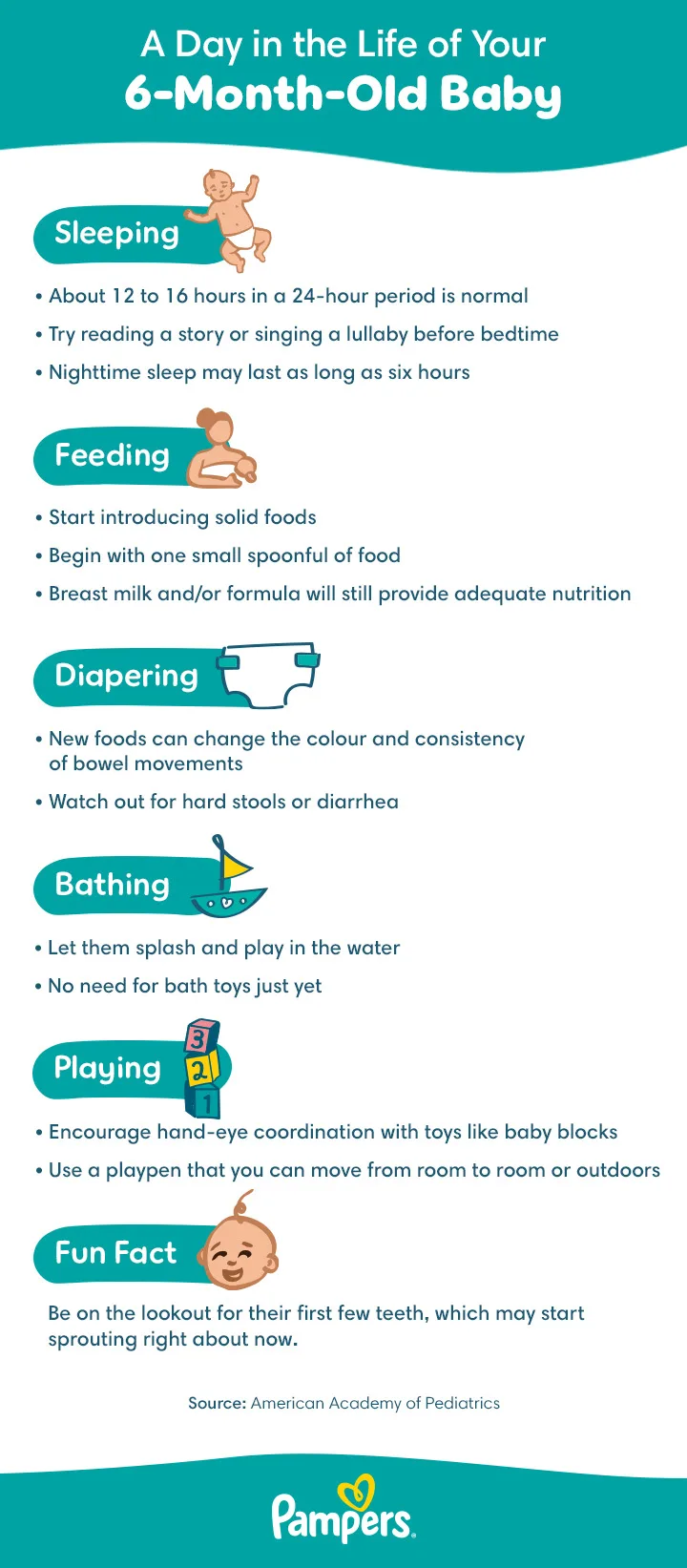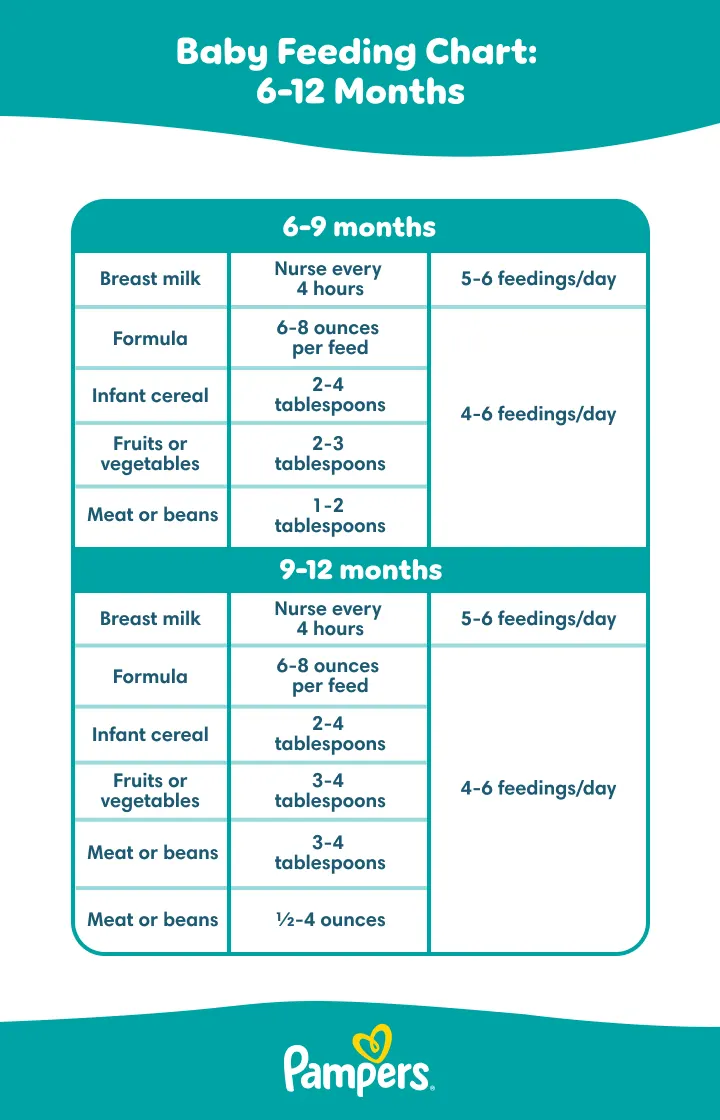Your 6-Month-Old Baby's Development and Milestones
At 6 months old, your baby is becoming more active, social, and curious, making this an exciting stage of development for both of you. From new physical skills to growing communication abilities, many 6-month-old babies begin sitting with some support, babbling more clearly, and reacting with joy to familiar faces and voices.
Here are some typical 6-month baby milestones:
Physical. Rolls over in both directions, begins to sit with support, may push up on hands and knees.
Cognitive. Explores by mouthing toys, reacts to sounds, and shows interest in new textures or mirror reflections.
Social/Emotional. Recognizes caregivers, expresses happiness or frustration more clearly, and engages during play.
Communication. Babbling becomes more complex (with vowel-consonant sounds), responds to name, and cries with meaning.
Tracking these 6-month milestones can help you feel more confident in your baby’s progress. In the sections below, we’ll take a closer look at each area of development and offer practical ways to support your little one’s growth, from feeding and sleep to playtime and health.
Baby Developmental Milestones
At 6 months, your little one is likely becoming more curious, social, and mobile. They may recognize familiar faces, respond to their name, and pause when you say “no”. Their vision has also improved, making it easier to follow moving objects from several feet away.
Physically, many babies are learning to roll over in both directions, so extra supervision is important when they’re on raised surfaces. These new movements, along with more deliberate gestures and sounds, signal the steady progress of their developmental milestones and emerging 6-month old gross motor skills.
Physical Growth: Average Weight and Length of a 6-Month-Old
“They grow so fast! ” You’ll probably hear this sentiment quite often. When your baby is 6 months old, they may have even doubled their birth weight, making you wonder how much should a 6 month old weigh. Not all babies will grow at the same rate, but don't be surprised if your baby gains around 0. 5 kilograms (1 to 1 1/4 pounds) a month at this stage. Those little bones are growing rapidly, too.
However, rather than focusing on exact numbers, healthcare providers use 6 month old weight and height percentile charts to track steady growth over time. You can also monitor your little one’s progress using our baby growth chart , a helpful tool to see how your baby’s development compares with general growth trends.
You might also notice a 6 month growth spurt —a short phase when your little one’s weight or length seems to jump more quickly than usual. Growth spurts are a natural part of development as your little one’s bones, muscles, and fat stores continue forming. They’re largely influenced by genetics, but things like diet, environmental factors, and pregnancy health can also play a role in how and when your baby grows.
Curious how your baby’s growth compares? Use our Baby Growth Chart Calculator to track weight, height, and head circumference percentiles over time—and get a clearer picture of your little one’s development.
Movement: Gross and Fine Motor Skills 6-Month-Olds Develop
At 6 months, your baby is likely becoming stronger and more coordinated. You might notice new 6-month-old gross motor skills, like rolling over in both directions, so be sure to supervise closely on raised surfaces.
These growing movements help build the strength your baby needs for what comes next. With improved neck and core muscles, many babies this age can sit with support and may soon start sitting independently for short periods. Over the weeks, they’ll get more confident, and soon they’ll also be able to remain sitting upright without any help.
You may also begin to see progress in Visit , like transferring objects between hands, reaching more precisely, or exploring toys with their fingers.
Cognitive Development in a 6-Month-Old
At this stage, your baby’s brain is developing rapidly, and it shows. A key part of a Visit includes sharper perception, growing curiosity, and more awareness of their surroundings.
Your little one’s depth perception is improving, and their vision has expanded. They can now see objects several feet away and focus without going cross-eyed. They’re also able to distinguish between a wider range of colours and track movement with more precision.
You may also notice your baby studying your face, responding to their name, or turning toward sounds, which are all signs that cognitive and sensory development are progressing as expected.
Behavioural Changes in a 6-Month-Old
At 6 months, your baby is becoming a more expressive and active participant in daily life. After months of listening closely, they may now begin imitating speech-like sounds, even if words are still far off from talking . You might also notice your little one responding when you say their name or pausing when you say “no”—early signs of growing awareness and understanding.
With this increased awareness, you may start asking yourself, “ Visit ? ” Fussiness at this age can stem from many normal changes, including teething, growth spurts, tiredness, or frustration as your baby tries to communicate more clearly.
It’s also common to notice early signs of Visit separation anxiety . Your baby may cry when you leave the room, cling to you more than before, or become wary of unfamiliar people. This behaviour is a normal stage of emotional development and reflects your baby’s growing understanding that you exist even when they can’t see you.
As your little one gets more mobile and curious, they may become a little feistier, too. At this age, discipline is about keeping your baby safe. Setting boundaries helps teach your little one what’s acceptable and unacceptable behaviour. The best way to handle an overly assertive 6-month-old is not to punish them, but to reward desired behaviour. If you notice your baby doing something that’s not allowed, stop them, let them know it’s wrong, and get them interested in a better activity instead.
Activities & Developmental Tips for Supporting Your 6-Month-Old
What should a 6-month-old baby be doing? At this stage, your little one may be sitting with support, reaching for toys, and exploring everything around them. It’s a fun and engaging time to bond, play, and help encourage your baby’s development through everyday interactions.
Looking for inspiration? Here are some activities for 6-month-olds that support growth in fun, easy ways:
Read together daily . Books with large, colourful images and simple text help introduce new words and concepts. Use expressive voices and sounds to keep your baby engaged.
Talk and sing. Describe what you’re doing, name objects, and respond when your baby babbles—this helps build early communication skills.
Encourage interaction. Your baby may want to touch, grab, or mouth books and toys. Let them explore safely—it supports learning through all their senses.
To build physical and emotional skills:
Play on the floor. Tummy time, rolling, and supported sitting are great for strengthening core and neck muscles.
Provide safe toys to grasp. Soft rattles, textured blocks, and teething rings are great for little hands.
Keep routines consistent. Familiar activities, soothing voices, and gentle caregiving help your baby feel secure.
Stay in tune with their mood. Whether they’re playful or tired, follow their cues. Your attention and responsiveness help them feel understood.
Wondering about other things to do with a 6-month-old ? Sometimes, it’s the simple moments—snuggling during a story, swaying to music, or making silly faces—that support the biggest leaps in learning and bonding.
What “Should” a 6-Month-Old Be Doing?
By now, you may be noticing that your baby’s days are settling into more predictable rhythms, and you might be wondering what a 6-month-old baby should be doing at this point. Whether you’re adjusting to routines or just looking ahead, this stage brings exciting changes.
Your little one may be starting to sit with support, showing more control when grabbing objects, reacting to familiar faces, and exploring everything within reach. Their daily routine likely includes naps, feedings, diaper changes, splashy bath time, and plenty of playful moments where they’re learning through every interaction.
Next up, we’ll explore each of these parts of your baby’s day in more detail, covering everything from meals to milestones to help you feel confident as you support their growth.
Starting Solid Foods: What Can You Feed a 6-Month-Old?
This month, you may be wondering, “What can I feed my 6-month-old baby? ” Welcome to the messy, exciting world of solids! While breast milk or formula remains your baby’s main source of nutrition, many babies are ready to try small tastes of real food now, too. It’s a milestone that’s both fun and important for growth.
Here are five simple steps to help you begin introducing Visit :
Choose a time when your baby is alert and slightly hungry.
Seat them upright in your lap or an infant chair.
Use a small spoon with a soft tip.
Let them smell and taste the food slowly.
Don’t worry if they push the food out or make a mess—it’s all part of learning.
Many families begin with iron-fortified single-grain baby cereal, or pureed vegetables and fruits. These early foods can be thinned with breast milk or formula to make swallowing easier. Get more tips on how to start solid foods one at a time . Start slow— Visit typically means just a spoonful or two once a day at first. Increase gradually as your baby shows interest and readiness.
As you try new foods, watch for possible allergic reactions like rashes , or diarrhea and vomiting. Reach out to your baby’s healthcare provider if you have concerns.
Some parents may explore baby-led weaning foods at 6 months, which means offering soft finger foods instead of spoon-fed purees. Steamed veggies like sweet potato wedges or avocado slices are common choices.
Also, try to avoid putting cereal in a bottle, unless recommended for medical reasons like reflux in babies , and never let your little one fall asleep while feeding from a bottle, as it may increase the risk of tooth decay.
6-Month-Old Feeding Schedule
At this stage, your little one’s feeding routine is likely evolving, and you may be thinking about what a balanced Visit might look like. While each baby is unique, many are now ready for a mix of milk feeds and early solid foods.
So, Visit ? Your baby still needs plenty of breast milk or formula, typically about 5 to 6 daily feedings, with around 180 to 240 ml (6 to 8 ounces) of milk per feed.
Additionally, many parents introduce small servings of solids once or twice a day. This can include 2 to 4 tablespoons of iron-fortified infant cereal, 2 to 3 tablespoons of pureed fruits or vegetables, and soft proteins like 1 to 2 tablespoons of mashed beans or cooked meats.
Not sure where your baby’s feeding schedule fits in? Take a look at the baby feeding chart below for a quick visual overview of how feeding patterns typically change from birth through 12 months . It can help you understand where your 6-month-old might be—and what’s coming next!
Teething at 6 Months Old
At this time, Visit is common, though every baby’s timeline is different. Some may already have a tooth or two coming in, while others might still be a few weeks away.Signs of teething can include extra drooling, fussiness, and a strong urge to chew on nearby objects
As teeth start to appear, early oral care is important.Use a soft, child-size toothbrush and a smear of fluoride toothpaste about the size of a grain of rice to gently clean your baby's gums and teeth
Because babies tend to explore the world by mouthing objects, especially when teething, keep choking hazards out of reach. Make sure toys and items they chew on are clean, safe, and size-appropriate.
Diapering
Starting solids around 6 months can bring noticeable changes to your baby’s diapers. Stools may become firmer, smellier, and change in colour, and it’s common to see undigested bits of food, like vegetables, in the diaper. Even cooked veggies can be tough for young digestive systems to fully break down.
It’s also possible for your baby to experience constipation or diarrhea as they try new foods. These changes may signal that a food isn’t sitting well. Iron-fortified options like rice cereal or formula may sometimes cause constipation.
To help ease digestion, continue offering breast milk or formula before solids—this ensures your little one gets the most nutritious food first and helps prevent overfilling on harder-to-digest items.
As always, if you’re concerned about changes in your baby’s bowel movements or see signs of discomfort, consult your baby’s healthcare provider.
As diapering needs evolve, a soft, absorbent diaper can make all the difference. Pampers Swaddlers are designed to stay snug and help protect against leaks while keeping your baby dry and comfortable throughout those busy, active days.
How Much Sleep Does a 6-Month-Old Baby Need?
How much sleep does a 6-month-old need? Your baby’s 6-month-old sleep schedule might now include longer stretches at night and more predictable naps. They might snooze for around nine hours at night, sometimes even longer, with a few brief awakenings. During the day, they will still need around two or three naps, since a typical 6-month-old nap schedule involves morning and afternoon naps totaling around three to four hours.
It’s common to notice a 6-month sleep regression, a brief phase when your baby’s sleep suddenly becomes more disrupted. Sleep regressions may happen at various stages during the first year and are often linked to developmental leaps or becoming more aware of their environment. If you’ve already experienced the 4-month sleep regression , this might feel familiar.
During a regression, your little one may wake more often, resist naps, or have trouble settling at bedtime. Staying consistent with routines may help, and for those interested, sleep training your 6-month-old may be easier now that their sleep patterns are more established.
If your baby’s sleep feels off track, the Smart Sleep Coach app offers personalized guidance. Cocreated by pediatricians, it includes a sleep tracker, tailored tips, and gentle coaching tools to support your baby’s sleep development.
Your Baby’s Health
At this age, your little one’s immune system is still developing, but is stronger than in those first few months. While Visit are better equipped to fight off infections, they’re also becoming more mobile and curious, meaning more chances to encounter germs.
It’s a good idea to keep your baby away from people who are sick whenever possible. But even with precautions, some common health issues might still pop up, especially as your little one tries new foods or explores their surroundings.
Here are a few health conditions to watch for:
Diarrhea. Loose stools can be caused by viruses, food sensitivities, or the introduction of juice or new foods.
Fever. A fever is often a sign that your baby’s immune system is fighting off an infection.
Ear Infections . These are especially common between 6 months and 3 years old and often follow colds.
If your baby shows signs of illness, like a high fever, discomfort, or a change in feeding or sleep patterns, consult their healthcare provider. They can guide you on treatment and make sure nothing more serious is going on.
The 6-Month Check-Up and Vaccinations
Your baby’s 6-month check-up is an important milestone for you and your healthcare provider to check in on growth, developmental progress, and overall well-being. It may also be the time for a series of Visit , which help build protection against several potentially serious illnesses.
Here are the typical Visit , but it's important to check in with your healthcare provider for specific timing, recommendations, and doses of the various vaccines:
DTaP-IPV-Hib or DTaP-HB-IPV-Hib (3rd dose). DTaP protects against diphtheria, tetanus, and whooping cough, which can be especially dangerous for babies. And Hib helps prevent serious illnesses caused by Haemophilus influenza type b, including meningitis.
Hepatitis B (3rd dose of 3). Prevents a virus that can cause chronic liver disease and cancer.
Rotavirus (2 or 3 doses before 8 months). Protects against a virus that causes severe diarrhea and vomiting in infants.
Pneu-C-15 or Pneu-C-20 (Pneumococcal conjugate 15 or 20-valent). Protects against multiple strains of Streptococcus pneumoniae, which can cause serious illnesses like pneumonia, meningitis, and bloodstream infections in babies.
Men-C-C (Monovalent conjugate meningococcal). Protects against Neisseria meningitidis group C, a bacterium that can lead to severe infections such as meningitis and septicemia.
RSV Ab (Respiratory syncytial virus monoclonal antibodies). Provides passive immunity to help protect babies from serious lower respiratory infections caused by the respiratory syncytial virus (RSV), especially during RSV season.
These infant 6-month vaccines are a safe and effective way to help your little one’s immune system build defenses early in life. Staying on schedule ensures the best protection at the right time.
Your baby’s provider will also check developmental milestones, ask about sleep, feeding, and any concerns you may have, so bring along your questions, especially if you’ve noticed any changes in your baby’s mood, habits, or health.
6-Month-Old Milestones Checklist
Remember, every baby develops at their own pace. But here are some typical 6-month-old milestones many parents notice around this age.Use this checklist to celebrate your baby’s progress and tune in to areas where they might need extra encouragement:
Rolls over in both directions
Sits upright with little or no support
Pushes up on arms and reaches confidently for toys
Uses hands and mouth to explore objects
Responds to their name and may pause when hearing “no”
Babbles with vowel-consonant sounds like “ba” or “da”
Shows deeper curiosity, studies faces, sounds, and surroundings
May show early signs of separation anxiety
Begins to try solid foods alongside breast milk or formula
Sleeps around 12 to 16 hours in 24 hours, including two to three naps
May receive infant 6-month vaccines during the well visit.
If you’re unsure about your little one’s development or something feels off, talk with your baby’s healthcare provider. They can offer insight, reassurance, and support tailored to your little one.
To Do’s and Items You’ll Need This Month
As your baby reaches the 6-month mark, they may be more active, curious, and eager to engage with the world around them.Here’s a helpful checklist of things to focus on this month to support their development, health, and safety:
Take a fresh look at babyproofing. Now’s a great time to reassess your space as your baby starts rolling, sitting, or preparing to crawl. Use this babyproofing guide to help you identify and prevent common household hazards.
Tuck away cords and charging cables
Secure furniture and decor that they might pull on
Cover sharp edges on furniture
Install baby gates if needed.
Get ready for your little one's 6-month checkup. Make a list of any questions you have about feeding, sleeping, development, or infant 6-month vaccines.
Celebrate your baby’s half-birthday with a photo! You could use monthly milestone cards to mark the moment and share with friends and family.
Looking ahead? Here’s a preview of what to expect next month .
Stock up on items you’ll need this month. A highchair for solid food feedings, a baby food maker (especially if you're trying purées or baby-led weaning), textured or musical toys to support play, a humidifier for dry air, a baby thermometer for fever checks, diapers, wipes, diaper rash cream, and childproofing basics like outlet covers and furniture straps.
FAQS AT A GLANCE
Most 6-month-olds are curious and social. They may sit with support, babble, respond to their name, reach for objects, and begin eating solid foods, all while exploring the world around them with growing mobility and awareness.
The Bottom Line
Reaching the 6-month mark is a big milestone for both you and your baby. They’re learning, growing, and becoming more aware of the world around them, while you’re finding your rhythm as a parent. Whether it's trying solids, sleeping longer, or babbling back at you, every moment is a sign of their progress and your care.
To support you along the way, the Pampers Club App offers digital offers on diapers and wipes. It’s a simple way to save as you continue showing up for your little one every day.
How We Wrote This Article The information in this article is based on expert advice found in trusted medical and government sources, such as the American Academy of Pediatrics and the American College of Obstetricians and Gynecologists. You can find a full list of sources used for this article below. The content on this page should not replace professional medical advice. Always consult medical professionals for full diagnosis and treatment.






